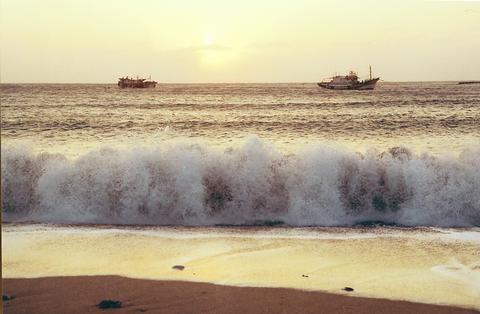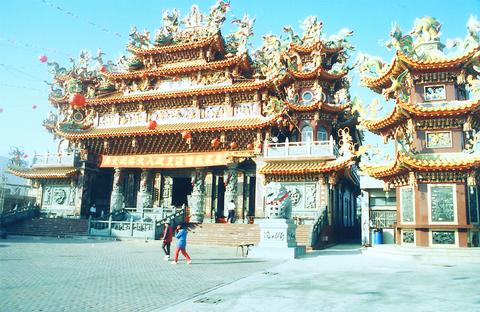Penghu is a favorite summer tourist destination which attracts thousands of weekenders with its brisk sea breezes and magnificent scenery. When the autumn gales begin to blow in October, however, the archipelago becomes deserted until April, when warmer weather seems to thaw the local tourism industry.
The islands' climate is also a curse on its economy, as it is adverse to agriculture, and its isolated location rules out large-scale manufacturing development. Generations of Penghu residents have made their living from the sea, but over-fishing has severely depleted stocks and damaged the industry.

PHOTO: DAVID VAN DER VEEN, TAIPEI TIMES
As a result, tourism has become the only way out of economic hardship. But for a county with a thinning population, which, according to the Penghu County government, receives 95 percent of its annual budget from central government subsidies, a solution is urgently needed that will boost tourist numbers throughout the year.

PHOTO: DAVID VAN DER VEEN, TAIPEI TIMES
Several projects aimed at attracting tourists in winter have been tried with only limited success. Others are in the works.
One such plan involves a draft law, which has passed its three readings before being passed in the Legislative Yuan, that would legalize gambling on Taiwan's outlying islands. If made into law, it is expected to lead to the construction of international holiday resorts where tourists can gamble. The prospect has led some to question the viability of developing large-scale tourism projects and raised moral questions about gambling. There are others who see casinos as Penghu's last chance at survival.
The popularity of tourism in Penghu is largely a result of government promotion. Ten years ago, the Taiwan government established the Penghu National Scenic Area Administration Office to promote the islands. The archipelago's 300km coastline has since become its main attraction. It offers a range of activities from parasailing and jetskiing to boating and snorkeling.
Penghu's location also lures over 200 species of migratory birds, making it an important spot for Asia's birdwatchers.
The islands, named the Pescadores by the Portuguese, were also among the first in the region to be developed, and have a rich cultural heritage dating as far back as the Ming dynasty.
Though Penghu is small enough to see in a couple of days, it boasts 47 temples open to visitors. Tianhou Temple (
The variety of activities the islands can provide draws up to 6,000 visitors per day in summer. That number drops with each mark on the thermometer.
To make tourism a year-round business, the Penghu County government has come up with events aimed at attracting tourists in winter. For the past three Novembers, the Cobia Sailboat Art Festival has been held with growing success. The number of tourists for the festival reached 2,000 this year, almost half of which came from abroad. To promote all aspects of tourism in Penghu, the event combined a concert by the Ju Zung-chieng Percussion Group (朱宗慶打擊樂團), a fishing tour and visits to coral reefs and the Penghu Aquarium.
To try to pull in the crowds, the county's tourism bureau promoted the event on several sports channels and the BBC, as well as through windsurfing clubs worldwide.
By contrast, the first International Earth Art Festival, which started on Nov. 10 on the island of Hsiyu, has received little media attention and attracted a much smaller audience than the sailboat art festival.
"Few people visit the venue on weekdays, but the number can get to nearly 100 on the weekends," said Chen Fu-chi (陳扶氣), a Penghu resident and one of the artists participating in the earth art festival.
"The small crowds that have come were mostly on their way to the Cobia festival. Most of us are bewildered at the disparity between the two festivals," he said, attributing it to the lack of promotion and the meager funding received from the government.
A more controversial way to develop tourism in Penghu throughout the year is the construction of large, international-standard hotels, which will probably integrate casinos. According to the scenic area administration, there are currently five holiday resorts being planned. The biggest of them will occupy more than 11 hectares. But only two of them, the Big Penghu International Holiday Resort in Paisha and the Jinsha Bay Holiday Resort in Lintou's urban planning district, will target families and international tourists with various facilities like a shopping mall, spa, nightclubs and casinos.
As most local residents foresee the legalization of gambling in Penghu, a debate on the topic has already begun to simmer.
"Surely we won't follow the Macau model, where hotels consist mainly of gambling houses. These planned resorts will integrate areas for various activities, including gambling.
"Neither are we going to follow the Las Vegas example and set up gambling machines everywhere. Everyone would oppose that," said an official at the Tourism Bureau surnamed Wang.
In August, the bureau held a public hearing and meetings to clarify the matter to residents and commissioned an opinion poll among residents. The results show that while half of the population is for the construction of large holiday resorts with casinos, 13 percent agree only to the resorts without casinos. Another 13 percent are indifferent.
"To the general public, building casinos and setting up art villages are incompatible ways to attract tourists. ... There is no question of one interfering with the other," said Hung Chi-kuang (洪志光), head of the planning section of the scenic area administration.
Most residents don't seem to care what is being built next to their houses, as long as it's something that can bring in money and job opportunities.
"People in Penghu are simple folk. Most people don't really know what is going on in the legislature about the casinos and the construction of five-star hotels. Many people agree to the legalization of gambling because they are desperate. The impoverished residents have been waiting for something to happen for decades. Now that there is something, people want to grab the chance," said Chen Chao-huei (陳昭回), who owns Chun Shen farm on Hsiyu, one of the islands where a large-scale holiday resort is planned.
Many Penghu residents live hand-to-mouth, doing odd jobs or relying on their families. "With all the ocean and nature around us, people would rather be fishermen if they had a choice. No one really wants to get involved in the hotel and casino business, but we are too poor," Chen said.
In Fengkuei, another planned resort site, residents live a quiet life of fishing as they have done for decades. There's neither excitement nor resentment when the casino topic is brought up.
"They don't care about what hotels or casinos will be built in the village. As far as they are concerned, they are going to fish all their lives," said a man surnamed Chang visiting from the island of Makung.
Most dissenters are teachers and government workers, who prefer a stable life undisturbed by the new plan. "Public sector workers oppose the legalization of casinos because they do not need it. They already have regular salaries," said the earth art festival's Chen.
Even among those who are financially desperate, not everyone is optimistic that increased tourism will benefit them. The lack of infrastructure that has hobbled domestic tourism is expected to have the same effect on international tourism as well.
"Building five-star hotels with casinos will not necessarily bring in international tourists and money. Look at Makung City. It's the main tourist area in Penghu and the hotels there are shamefully dilapidated and low-class. We don't even have an international airport," said Chang, who is currently unemployed.
However, his main concern is not material welfare, but the quality of life in Penghu.
"Without proper policies to go with the development projects, we will be making money at the expense of nature and a simple way of life -- these are what make Penghu proud," Chang said.
"Now we enjoy our safety, we can sleep at night with our house doors wide open," he said. "But what will happen after people are allowed to gamble? Taiwan proper is already ruined. We can't afford to lose Penghu. It's Taiwan's last piece of paradise."

April 14 to April 20 In March 1947, Sising Katadrepan urged the government to drop the “high mountain people” (高山族) designation for Indigenous Taiwanese and refer to them as “Taiwan people” (台灣族). He considered the term derogatory, arguing that it made them sound like animals. The Taiwan Provincial Government agreed to stop using the term, stating that Indigenous Taiwanese suffered all sorts of discrimination and oppression under the Japanese and were forced to live in the mountains as outsiders to society. Now, under the new regime, they would be seen as equals, thus they should be henceforth

Last week, the the National Immigration Agency (NIA) told the legislature that more than 10,000 naturalized Taiwanese citizens from the People’s Republic of China (PRC) risked having their citizenship revoked if they failed to provide proof that they had renounced their Chinese household registration within the next three months. Renunciation is required under the Act Governing Relations Between the People of the Taiwan Area and the Mainland Area (臺灣地區與大陸地區人民關係條例), as amended in 2004, though it was only a legal requirement after 2000. Prior to that, it had been only an administrative requirement since the Nationality Act (國籍法) was established in

With over 80 works on display, this is Louise Bourgeois’ first solo show in Taiwan. Visitors are invited to traverse her world of love and hate, vengeance and acceptance, trauma and reconciliation. Dominating the entrance, the nine-foot-tall Crouching Spider (2003) greets visitors. The creature looms behind the glass facade, symbolic protector and gatekeeper to the intimate journey ahead. Bourgeois, best known for her giant spider sculptures, is one of the most influential artist of the twentieth century. Blending vulnerability and defiance through themes of sexuality, trauma and identity, her work reshaped the landscape of contemporary art with fearless honesty. “People are influenced by

The remains of this Japanese-era trail designed to protect the camphor industry make for a scenic day-hike, a fascinating overnight hike or a challenging multi-day adventure Maolin District (茂林) in Kaohsiung is well known for beautiful roadside scenery, waterfalls, the annual butterfly migration and indigenous culture. A lesser known but worthwhile destination here lies along the very top of the valley: the Liugui Security Path (六龜警備道). This relic of the Japanese era once isolated the Maolin valley from the outside world but now serves to draw tourists in. The path originally ran for about 50km, but not all of this trail is still easily walkable. The nicest section for a simple day hike is the heavily trafficked southern section above Maolin and Wanshan (萬山) villages. Remains of